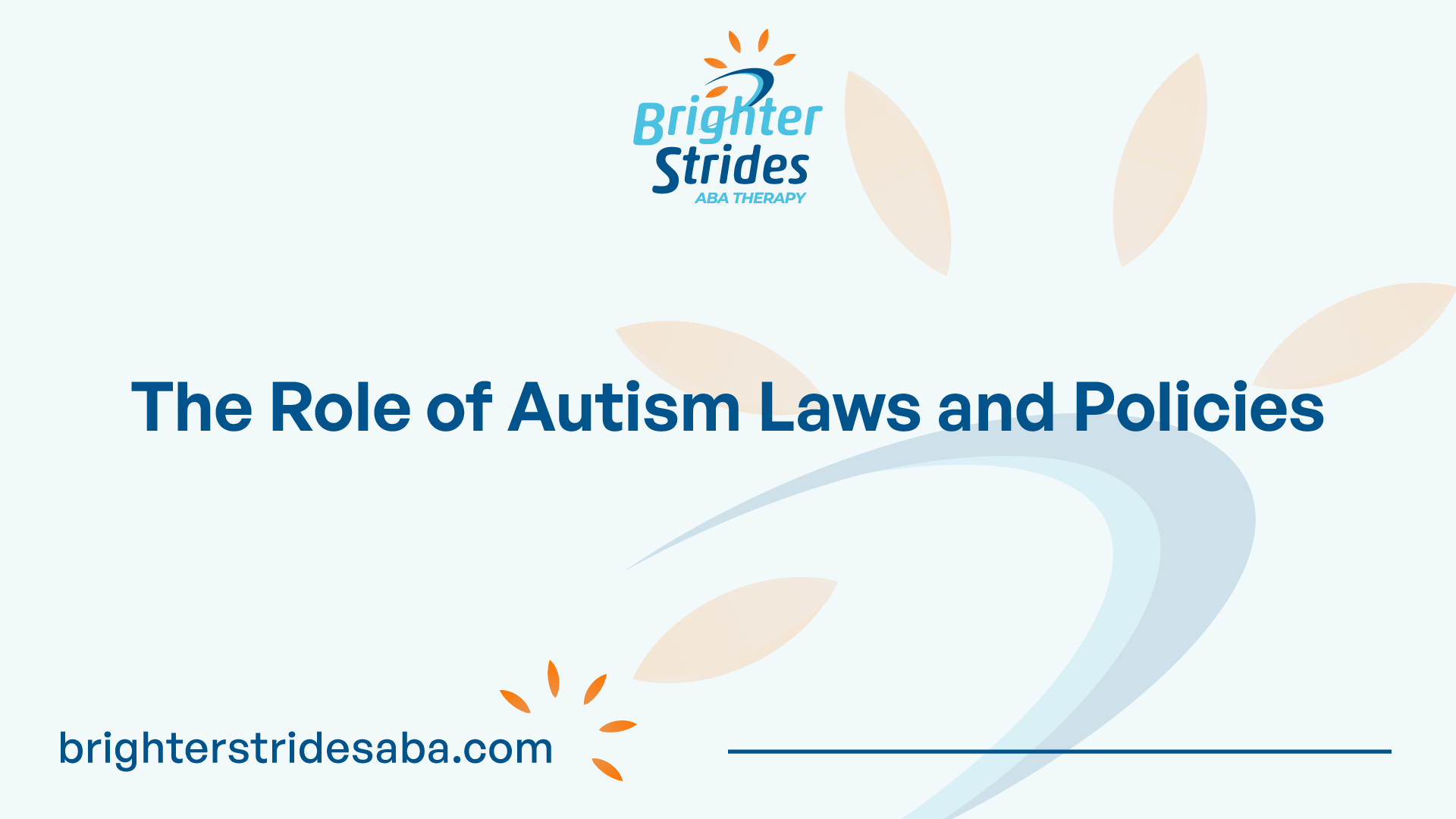Understanding Autism Laws
Autism laws and policies play a crucial role in ensuring that individuals with autism spectrum disorder (ASD) receive the necessary support and accommodations to thrive in society. These laws aim to address various aspects of autism, ranging from federal support and funding to state-specific variations in diagnosis.

Federal Support and Funding
The U.S. government recognizes the importance of providing support and funding for individuals with autism and other developmental disabilities. Federal departments and agencies have been established to address the unique needs of individuals with ASD. These entities offer funding, programs, and support to enhance the lives of individuals with autism and their families [1].
State Variations in Diagnosis
Diagnosing autism can vary from state to state within the United States. The proportion of children diagnosed with ASD can differ significantly between states. For example, in the academic year 2000-2001, states ranged in the proportion of children diagnosed with ASD from 0.6 per 1000 to 4.6 per 1000.
Several factors influence these state variations in diagnosis. Education-related spending, the number of pediatricians in the state, and the number of school-based health centers all play a role. Studies have shown that each $1 million increase in states’ education spending was associated with a 0.02% increase in the prevalence of ASD. Similarly, each additional pediatrician was associated with a 0.06% increase in the prevalence of ASD. Furthermore, each additional school-based health center was associated with a 0.6% increase in the prevalence of children with ASD.
Understanding these state variations is essential in developing effective autism laws and policies. By recognizing the impact of education spending, pediatrician density, and school-based health centers on ASD prevalence, policymakers can work towards creating more comprehensive and equitable support systems for individuals with autism across different states.
Understanding the nuances of federal support and funding, as well as state variations in diagnosis, is crucial for developing effective autism laws and policies. These laws aim to provide the necessary resources and support to individuals with ASD, ensuring that they have equal opportunities to thrive and participate in society.
Impact of Education Spending
Education spending plays a significant role in shaping the prevalence of Autism Spectrum Disorder (ASD) and the availability of resources to support individuals with autism. Let’s explore the influence of education spending on ASD prevalence and the effects of pediatrician density.
Influence on ASD Prevalence
Research has shown that there is a correlation between education spending and the prevalence of ASD. A study published in JAMA Pediatrics found that each $1 million increase in states’ education spending was associated with a 0.02% increase in the prevalence of ASD [2]. This suggests that increased investment in education can lead to better identification and support for individuals with autism.
States in the US have demonstrated variations in the proportion of children diagnosed with ASD, ranging from 0.6 per 1000 to 4.6 per 1000 in the academic year 2000-2001. The study also found a positive association between education-related spending and the administrative prevalence of ASD. This highlights the importance of adequate funding for educational programs and services that cater to the unique needs of individuals with autism.
Pediatrician Density Effects
The availability of healthcare professionals, specifically pediatricians, also has an impact on the prevalence of ASD. According to the same study, each additional pediatrician was associated with a 0.06% increase in the prevalence of ASD. This suggests that areas with a higher density of pediatricians may have improved access to diagnostic services and early intervention for children with autism.
Furthermore, the study found that each additional school-based health center was associated with a 0.6% increase in the prevalence of children with ASD. This indicates that these centers can play a vital role in identifying and supporting children with autism within the educational setting.
It is important to recognize the impact of pediatrician density and the presence of school-based health centers in ensuring early diagnosis, intervention, and support for individuals with ASD. By investing in healthcare infrastructure and increasing access to specialized services, communities can better address the needs of individuals with autism and promote their overall well-being.
In summary, education spending and the density of pediatricians have a significant impact on the prevalence and support available for individuals with Autism Spectrum Disorder. Adequate funding for education, along with increased access to healthcare professionals, can contribute to early identification, intervention, and improved outcomes for individuals with ASD.
The Americans with Disabilities Act (ADA)
The Americans with Disabilities Act (ADA) is a federal civil rights law that aims to protect the rights of individuals with disabilities, including those with autism. The ADA prohibits discrimination against people with disabilities in various aspects of life, ensuring they have the same opportunities as everyone else to enjoy employment opportunities, purchase goods and services, and participate in state and local government programs.
Protections and Guarantees
Under the ADA, it is illegal to discriminate against someone because of their disability. This includes individuals with autism, who are protected by the ADA’s provisions. The ADA prohibits disability discrimination in many areas of life, including employment, state and local government services, public transit, businesses open to the public, and telecommunications.
The ADA ensures that individuals with disabilities, including those with autism, have equal opportunities and access to various aspects of life. It guarantees that people with disabilities can enjoy the same benefits and opportunities as those without disabilities, without facing discrimination.
Titles I, II, and III Explained
The ADA is organized into different titles that address specific areas of life where discrimination against individuals with disabilities is prohibited. These titles provide guidelines and regulations that businesses, employers, and state and local governments must adhere to.
- Title I of the ADA covers requirements for employers with 15 or more employees, including state and local governments, employment agencies, and labor unions. It ensures that people with disabilities have equal opportunities to benefit from employment-related opportunities such as recruitment, hiring, promotions, and training.
- Title II of the ADA applies to all services, programs, and activities of state and local governments. It requires state and local governments to provide people with disabilities an equal opportunity to benefit from all programs, services, and activities. This includes areas such as public transportation, education, and government services.
- Title III of the ADA applies to businesses open to the public and requires them to provide people with disabilities equal opportunity to access the goods or services they offer. This includes privately operated transit and commercial facilities. It ensures that individuals with disabilities, including those with autism, can fully participate in public life and access the necessary services [3].
By implementing and enforcing these titles, the ADA plays a crucial role in promoting equality, access, and protection for individuals with disabilities, including those with autism. It ensures that people with disabilities have the same opportunities as others and are not subjected to discrimination in various aspects of life.
Legal Rights of Autistic Adults
Autism laws and policies play a crucial role in ensuring the protection and empowerment of autistic adults, promoting their rights, opportunities, and overall quality of life. Autistic adults have the legal right to be treated fairly and without discrimination in all aspects of life, including employment, education, healthcare, and housing.
Fair Treatment and Accommodations
One of the fundamental legal rights of autistic adults is the right to fair treatment and reasonable accommodations. This means that individuals on the autism spectrum should be given the same opportunities as their neurotypical peers, without facing discrimination. Autistic adults have the right to be free from prejudice or bias in employment, housing, and public services.
To ensure their full participation and inclusion in society, autistic adults are entitled to reasonable accommodations and adjustments. These accommodations may include modifications to the workplace, educational settings, or housing arrangements, allowing individuals with autism to thrive and contribute to society in a meaningful way.
Education and Individualized Plans
Autistic adults also have the legal right to receive an education that meets their unique needs. Inclusive education practices are essential in providing an environment where individuals with autism can learn and grow alongside their peers. This includes creating an inclusive classroom setting, providing appropriate support, and making necessary accommodations to ensure equal access to education.
Individualized Education Plans (IEPs) are an important component of the legal rights of autistic adults in education. An IEP is a personalized plan that outlines the specific educational goals, services, and accommodations tailored to meet the individual needs of the student. These plans help ensure that autistic adults receive the support necessary to succeed academically and reach their full potential [4].
By upholding the legal rights of autistic adults to fair treatment, reasonable accommodations, and an inclusive education, society can create an environment that allows individuals with autism to thrive and contribute their unique skills and perspectives. Autism laws and policies aim to address the unique needs and challenges faced by autistic adults, providing guidelines and standards for equal access to education, employment, healthcare, housing, and other essential aspects of life.
Autism Laws for Healthcare
Ensuring access to healthcare services and appropriate insurance coverage for individuals with autism spectrum disorder (ASD) is essential for their well-being and development. Autism laws and policies play a crucial role in addressing these healthcare needs. In this section, we will explore two important aspects: ASD insurance mandates and access to healthcare services.
ASD Insurance Mandates
In recent years, states have made significant strides in introducing mandates that require insurers to provide coverage for autism care. However, the generosity of these benefits can vary dramatically across states. The passage and generosity of these mandates are influenced by the ideology of state residents and politicians, with more liberal citizens and increased Democratic control of state governments associated with more generous benefits.
It is important to note that most states impose limits on these benefits, either by restricting eligibility to certain age groups or by capping the required spending by insurance companies for behavioral treatments. As a result, only a select number of states have mandated more generous benefits.
While progress has been made in ensuring insurance coverage for ASD-related therapies, challenges still exist. Many parents find themselves resorting to litigation when insurance companies deny therapy services to children with ASD, highlighting the need for continued advocacy and improvement in insurance coverage [6].
Access to Healthcare Services
In addition to insurance mandates, access to healthcare services is a critical aspect of autism laws and policies. Individuals with ASD often require specialized services, such as behavioral therapies, speech therapy, occupational therapy, and more. Ensuring access to these services can significantly impact the well-being and development of individuals with autism.
To address these needs, it is important for healthcare policies to prioritize the availability of qualified professionals who specialize in autism care, such as developmental pediatricians, psychologists, and therapists. However, there is a shortage of developmental pediatricians in many areas, making it challenging for individuals with ASD to access the specialized care they require.
Efforts should be made to increase the number of healthcare professionals specializing in ASD and provide resources to underserved areas. This can be achieved through initiatives such as increased funding for training programs, scholarships, and incentives to attract professionals to areas with limited access to autism-related healthcare services.
By implementing and improving autism laws for healthcare, society can ensure that individuals with ASD have equitable access to the necessary services and support they need for a fulfilling and healthy life. Continued advocacy, research, and collaboration are vital in shaping policies that promote the well-being and inclusion of individuals with autism.
Challenges and Solutions
When it comes to autism laws and policies, there are several challenges that need to be addressed in order to ensure the well-being and support of individuals with autism. Two significant challenges include the increasing prevalence rates of autism and the shortage of developmental pediatricians.
Increasing Prevalence Rates
Over the past two decades, the prevalence rates of autism have been on the rise. However, the workforce and programs to provide services have not grown at the same pace, leading to a significant gap in resources. The increasing prevalence of autism emphasizes the need for early identification, diagnosis, and intervention services to support individuals with autism and their families.
To address this challenge, it is crucial to improve access to developmental and behavioral screening for children. The American Academy of Pediatrics recommends regular screening at specific ages using standardized tools. By implementing these screening protocols, healthcare professionals can identify developmental delays at an early stage and refer children for further assessment and intervention.
Additionally, increasing awareness and education about autism can help reduce stigma and promote understanding in communities. This can lead to better acceptance and support for individuals with autism and their families, ensuring they receive the necessary services and resources.
Shortage of Developmental Pediatricians
A significant challenge in the field of autism is the shortage of developmental pediatricians. According to a 2017 study, there are approximately 800 developmental pediatricians in the U.S., with only 31 pediatricians entering the developmental subspecialty each year. This shortage leads to long waiting periods for appointments, making it difficult for individuals with autism to access timely evaluations and interventions.
To address this issue, efforts should focus on increasing the number of developmental pediatricians and providing incentives for pediatricians to specialize in developmental care. Encouraging medical students and residents to pursue this subspecialty can help bridge the gap in the workforce. Additionally, telehealth services and other innovative approaches can be utilized to reach individuals in remote areas who may have limited access to developmental pediatricians.
Collaboration between different healthcare professionals, such as pediatricians, psychologists, and speech therapists, is also essential. By working together, they can provide comprehensive care and support for individuals with autism, even in the absence of a developmental pediatrician.
In conclusion, addressing the challenges of increasing prevalence rates and the shortage of developmental pediatricians is crucial for effective autism laws and policies. By focusing on early identification, intervention, and increasing the healthcare workforce, we can ensure that individuals with autism receive the support and services they need to thrive.
References
- https://iacc.hhs.gov/resources/organizations/federal/
- https://jamanetwork.com/journals/jamapediatrics/fullarticle/485957
- https://www.ada.gov/topics/intro-to-ada/
- https://www.abtaba.com/blog/autism-laws-and-policies
- https://www.ncbi.nlm.nih.gov/pmc/articles/PMC6534322/
- https://www.ncbi.nlm.nih.gov/pmc/articles/PMC10849157/




